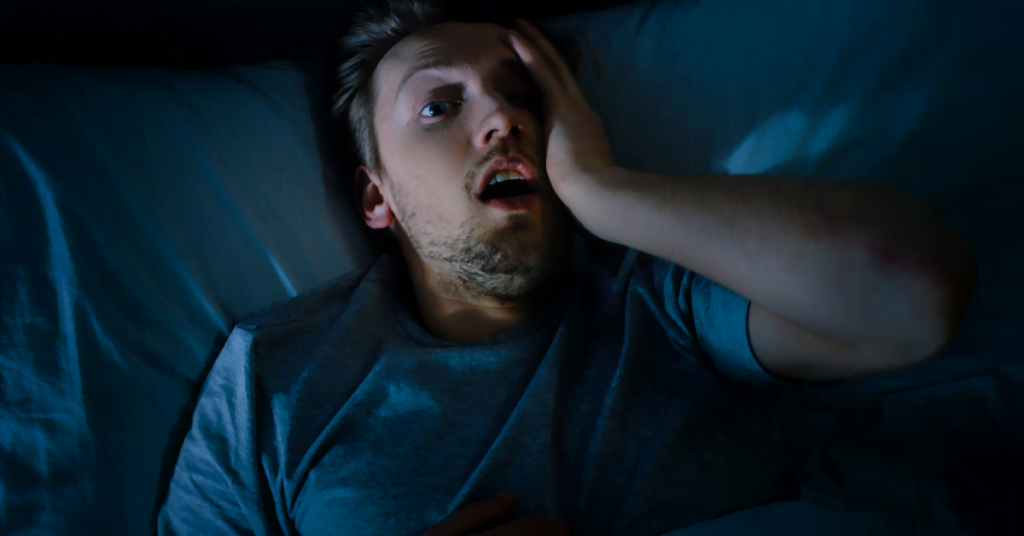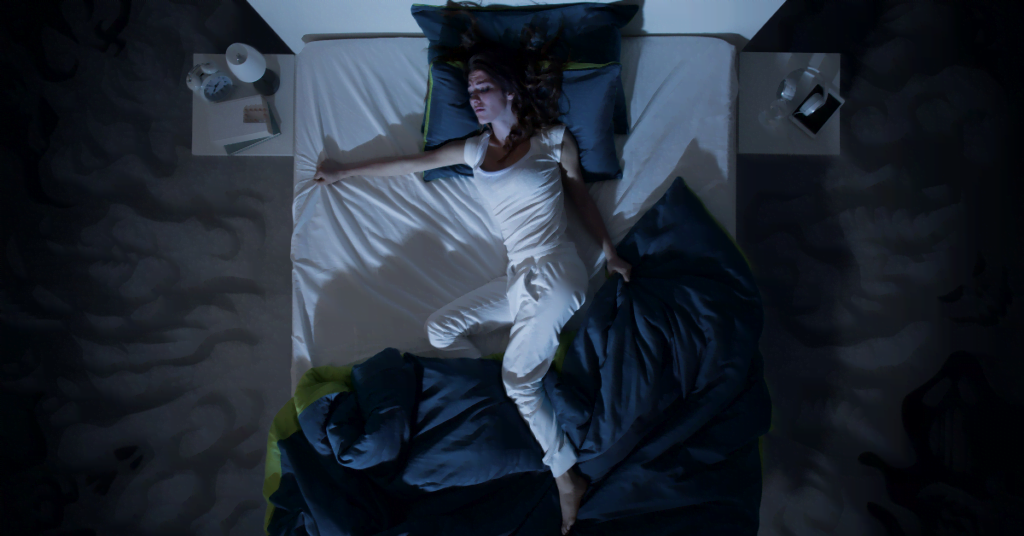What is night sweats
Night sweats, originate in the human body’s natural mechanism to cool down and prevent overheating. Unlike normal perspiration, sweating in your sleep often causes discomfort. It results in waking up during the night soaked in sweat, saturating nightwear and bedding.
It is a common phenomenon that affects both men and women. Sweating in bed can be a nuisance not only to the individual but also to their closest partners, and it can affect the quality of sleep.
Symptoms of night sweats
The symptoms are distinctive and can significantly disrupt both the person and their immediate environment’s sleep. Some common symptoms of night sweats include:
- Excessive sweating: Night sweats are characterized by excessive sweating during sleep, resulting in soaked nightwear and bedding.
- Feeling warm: Individuals who suffer from night sweats often experience an intense feeling of warmth, which can wake them and disrupt their sleep.
- Heart palpitations: Night sweats are sometimes accompanied by increased heart rate, which can increase discomfort and anxiety.
- Disrupted Sleep: Regular night sweats can lead to a disrupted sleep cycle, resulting in fatigue and daytime sleepiness.
- Sweaty feet: Suffers from excessively sweaty feet even in cold environments
It is important to note that night sweats are a complex symptom that can have several causes. It is advisable to seek medical advice when symptoms are persistent or alarming to determine the underlying cause and take appropriate action.
Causes of night sweats

Night sweats can be attributed to several underlying causes, identifying the specific trigger is critical for effective treatment. Some common causes of night sweats are:
- Hormonal Changes: One of the most common causes of night sweats in women is hormonal fluctuations. This can occur during menopause, where the decrease in estrogen levels can cause night sweats and hot flashes.
- Infections: Some infectious diseases, such as tuberculosis or HIV, may involve sweating as a symptom. This is usually related to the febrile nature of such diseases.
- Medication use: Certain medications, such as antidepressants, hormonal treatments or certain fever-reducing drugs, may have night sweats as a side effect.
- Psychological Factors: Stress and anxiety can affect the autonomic nervous system, which can trigger or worsen perspiration.
- Medical Conditions: Night sweats can also occur as a result of underlying medical conditions such as hormonal disorders, neurological disorders or certain cancers.
- Diet and Lifestyle: Consumption of certain foods, alcohol or caffeine before bedtime, as well as intense exercise late at night, can trigger night sweats.
- Environmental factors: An overly warm sleeping environment, poorly ventilated rooms or the use of overly warm bed clothes can lead to night sweats.
Night sweats in a woman

Night sweats in women is a phenomenon that requires attention because it can present a range of physical and emotional challenges.
Night sweats in women are often associated with hormonal changes, especially during the menopausal years (menopause), when estrogen production decreases. These hormonal fluctuations can cause intense hot flashes and night sweats.
Night sweats in a man
Night sweats in men due to hormonal fluctuations are less common in men than in women. The name for this is andropause (a male counterpart of menopause).
Understanding night sweats in both men and women is critical to providing appropriate treatment and support. It is advisable to consult regular symptoms with a medical professional to determine the best course of action and rule out possible underlying health issues.
What can you do about night sweats
When faced with night sweats, it is essential to consider effective measures to relieve discomfort and improve the quality of sleep. Here are some steps and recommendations that can be taken when treating night sweats:
- Create a Cool Sleep Environment: Make sure the bedroom is kept at a comfortable temperature. A cool sleep environment can help reduce night sweats in your sleep.
Consider using lightweight bedding and ventilation to regulate temperature and get rid of excess heat. - Suitable Nightwear: Wear breathable, lightweight nightwear made from natural materials such as cotton sheets. This can help wick away moisture and regulate body temperature and reduce sweating.
- Hydration: Be sure to stay well hydrated throughout the day, but reduce fluid intake in the hours before bedtime to avoid frequent toilet visits.
- Dietary choices: Avoid eating heavy meals, spicy foods, alcohol and caffeine before bedtime, as these factors can aggravate excessive sweating.
- Stress management: Practice relaxation techniques, such as deep breathing, meditation or yoga, to reduce stress and anxiety, which can contribute to night sweats.
- Review of Medications: Consult with a physician if you suspect that medications may be causing night sweats. In some cases, adjusting medications or switching to alternative medicines may solve the problem.
- Consult a Physician: If night sweats persist and cause severe discomfort, it is advisable to consult a physician. A medical assessment can help identify the underlying cause and appropriate treatment options.
- Hormonal Therapy: In cases of excessive sweating associated with menopause, hormone replacement therapy may be considered by a physician.
- Change nightwear: Keep extra nightwear on hand so you can change if necessary when you wake up at night because of sweating.
Addressing night sweats often requires a combination of measures tailored to personal needs and circumstances. It is important to be patient and, if necessary, seek professional medical advice to determine the cause of night sweats and take appropriate steps.
Help with night sweats
With persistent night sweats, consulting a health care provider and seeking professional help can be critical to adequately address this symptom and identify the underlying cause. Here are some steps and considerations regarding seeking help.
- Consult a GP: If excessive night sweats are frequent, persistent or cause severe discomfort, it is advisable to consult a GP. A family physician can take a detailed medical history, perform a physical examination and take further diagnostic steps to determine possible underlying causes.
- Specialist Help: In some cases, referral to a specialist, such as an endocrinologist, gynecologist, or internist, may be necessary to investigate and treat specific causes of night sweats.
- Medical Tests: Depending on medical history and symptoms, the doctor may recommend additional tests such as blood tests, hormone level tests, or imaging to identify the underlying cause.
- Treatment options: Once the cause is determined, the doctor can discuss treatment options. This can range from drug therapy, hormone replacement therapy, to lifestyle and dietary modifications.
- Psychological Support: In cases where stress or anxiety is a contributing factor, psychological support in the form of counseling or therapy may be considered.
- Education and Self-Care: Understanding the cause and adopting preventive measures is an important part of treatment. Healthcare providers can provide patients with educational materials and advice on self-care.
- Follow-up Appointments: It is important to schedule follow-up appointments with the health care provider to review treatment progress and make any adjustments as needed.
- Quality of life: Above all, the goal of medical help for night sweats is to improve overall quality of life by relieving symptoms and addressing any underlying health problems.
It is crucial to take medical guidance and recommendations from health care providers seriously to effectively manage symptoms and reduce potential health risks. Timely medical evaluation and care can significantly improve quality of life for those dealing with night sweats.
